Bienvenue back to ILTBTA! For those looking for a little escapism after a long election season, we’ve got just the movie for you: a movie about literal escapes. Transport yourself to Europe during World War I and join some French prisoners of war as they attempt to escape their German captors. (Make sure you pay close attention: you or someone you know might need to learn the art of escape sooner than you realize!) So grab a shovel for the tunnel and let’s dig in!

Previews
What, if anything, did we know about this coming attraction before we watched it?
Ellen: I had hoped this might be about magicians, so hopefully these guys bring the magic!
Tyler: *Googles how to say “nothing” in French* I, too, thought this would be about a magician. It appears we know rien about this movie!
Plots & Feelings
This one’s pretty self-explanatory.
Short Version (courtesy of IMDb): During WWI, two French soldiers are captured and imprisoned in a German P.O.W. camp. Several escape attempts follow until they are eventually sent to a seemingly inescapable fortress.
Long Version (modified from Wikipedia and formatted to fit your screen):
During the First World War, two French aviators of the Service Aéronautique, the aristocratic Captain de Boëldieu and the working-class Lieutenant Maréchal, set out to investigate a blurred spot found on reconnaissance photographs. They are shot down by German flying ace and aristocrat, Rittmeister von Rauffenstein, and both are taken prisoner by the Imperial German Army. Upon returning to the aerodrome, Rauffenstein sends a subordinate to find out if the aviators are officers and, if so, to invite them to lunch. During the meal, Rauffenstein and Boëldieu discover they have mutual acquaintances—a depiction of the familiarity, if not solidarity, within the upper classes that crosses national boundaries.
Ellen: If you wrote a script today and named your German character Rittmeister von Rauffenstein, you’d be laughed out of the room.
Ellen: It’s another mark of Rauffenstein’s aristocracy that he effortlessly switches to French to speak with the prisoners. The group also randomly switches to English for like two sentences at a time.
Tyler: I thought the same thing! Here’s what Wikipedia had to say about the language-switching: “They (Boeldieu and Rauffenstein) converse with each other in heavily formal French and German, and in moments of intimate personal conversation, escape into English as if to hide these comments from their lower class counterparts.”
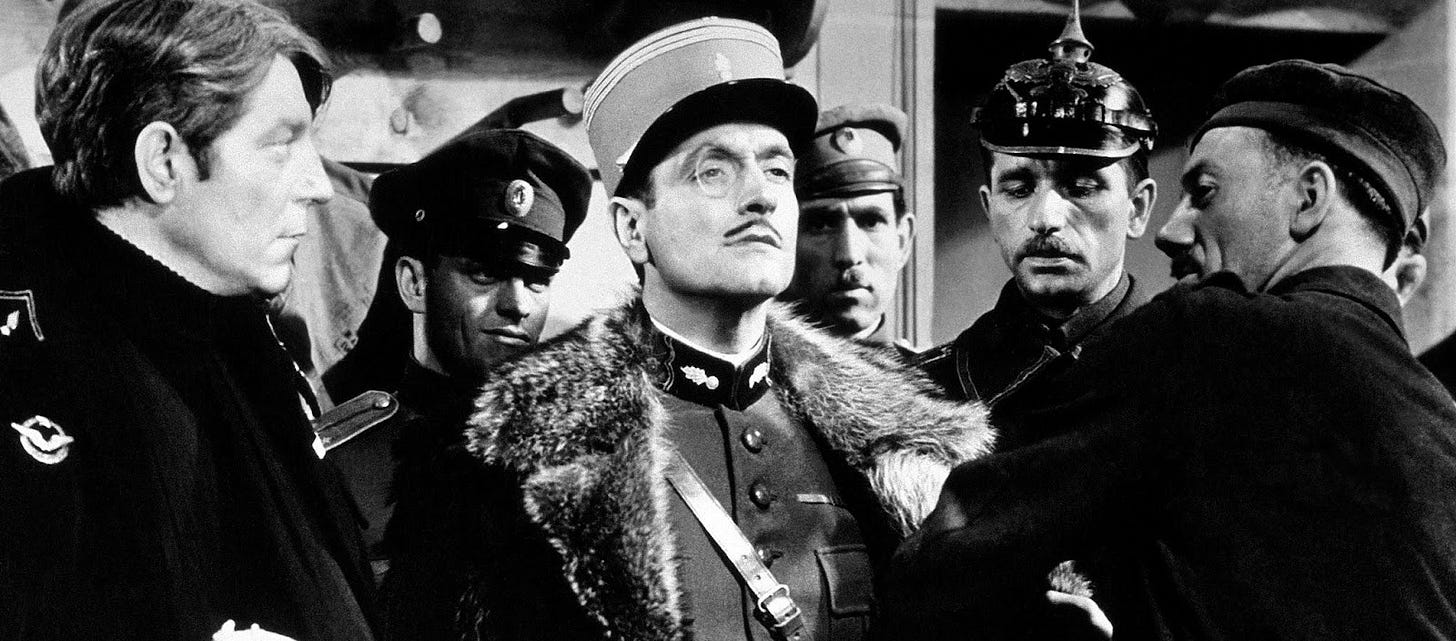
Boëldieu and Maréchal are then taken to a prisoner-of-war camp, where they meet a colorful group of French prisoners and stage a vaudeville-type performance just after the Germans have taken Fort Douaumont in the epic Battle of Verdun. During the performance, word arrives that the French have recaptured the fort. Maréchal interrupts the show, and the French prisoners spontaneously burst into "La Marseillaise". As a result of the disruption, Maréchal is placed in solitary confinement, where he suffers badly from lack of human contact and hunger; the fort changes hands once more while he is imprisoned.
Tyler: I’m gonna be honest, the vibes in here are a LOT better than I was expecting coming into this: I know they're POWs, but they've got gardening, prisoner parcels with legit food, and musicals?!

While he was in solitary, Maréchal was unable to help with the French escape plan! They’ve been working on a fairly sophisticated escape tunnel under the floorboards of their rooms. However, just before it is completed, everyone is transferred to other camps. Because of the language barrier, Maréchal is unable to pass word of the tunnel to an incoming British prisoner.
Ellen: The discovery that they were being moved to a different camp felt very abrupt to me, and I wonder if it was deliberate or something lost in translation. There were instances where I found the English subtitles to be overly simplistic, like one time you could clearly hear Maréchal say “Tour de France,” but the text just said like “French professional cycling” or whatever.
Tyler: If it was deliberate, I thought it was an interesting and unexpected plot development. Just as you (and our protagonists) get used to their current camp and think we’re gonna spend the rest of the movie there, we’re suddenly moved elsewhere to remind you who really has the power in the relationship.

Boëldieu and Maréchal are moved from camp to camp, finally arriving in Wintersborn, a mountain fortress prison commanded by Rauffenstein, who has been so badly injured in battle that he has been given a posting away from the front, much to his regret. Rauffenstein tells them that Wintersborn is escape-proof, referencing their many escape attempts over the course of their prison transfers (four from Boëldieu, five from Maréchal).
Ellen: As one French prisoner puts it: a golf course is for golf, a tennis court is for tennis, and a prison camp is for escape!
At Wintersborn, the pair are reunited with a fellow prisoner, Rosenthal, from the original camp. Rosenthal is a wealthy French Jew who generously shares the food parcels he receives, which is how the men end up eating cold chicken1, pate de foie, mackerel in wine, and cognac. The Russian contingent in the camp isn’t nearly as lucky, because when they receive a large chest from the Empress, it turns out to be full of books! In their disappointment, the Russians burn them all. Boëldieu comes up with an idea after carefully observing how the German guards respond to the blaze. He volunteers to distract the guards for the few minutes needed for Maréchal and Rosenthal to escape. Maréchal attempts to talk to Boëldieu about the sacrifice he’ll be making, but the older man will not allow for gratitude or any emotional talk, which is probably part of why Maréchal and Rosenthal find him so un-relatable.
Boëldieu somehow ensures that every prisoner gets a flute, and all of them start playing at the same time. After the Germans break it up once, the prison band starts up again, this time with even more disruptive pots and pans. The commotion results in the guards ordering all of them to assemble them in the fortress courtyard. During the roll call, it is discovered that Boëldieu is missing. He makes his presence known high up in the fortress, drawing the German guards away in pursuit. Maréchal and Rosenthal take the opportunity to lower themselves from a window by a homemade rope and flee.
Ellen: It’s impressive to the point of near unbelievability that they got the entire camp to participate in a scheme that only allowed two people to escape. I guess it’s just that everyone wanted a win against their jailors, even if only two prisoners got away.
Tyler: I wonder if “inescapable” reputation sunk in more for the rest of the prisoners and they were just like “Yea sure we’ll help you out because (like you said) it’s a fun middle-finger to our captors, but there’s no chance you’ll actually make it.” Or they were just too afraid / lacked the creativity to try something themselves?
Tyler: Also, I’m a little bummed that this supposed inescapable fortress was seemingly defeated by … a long rope. That’s it?
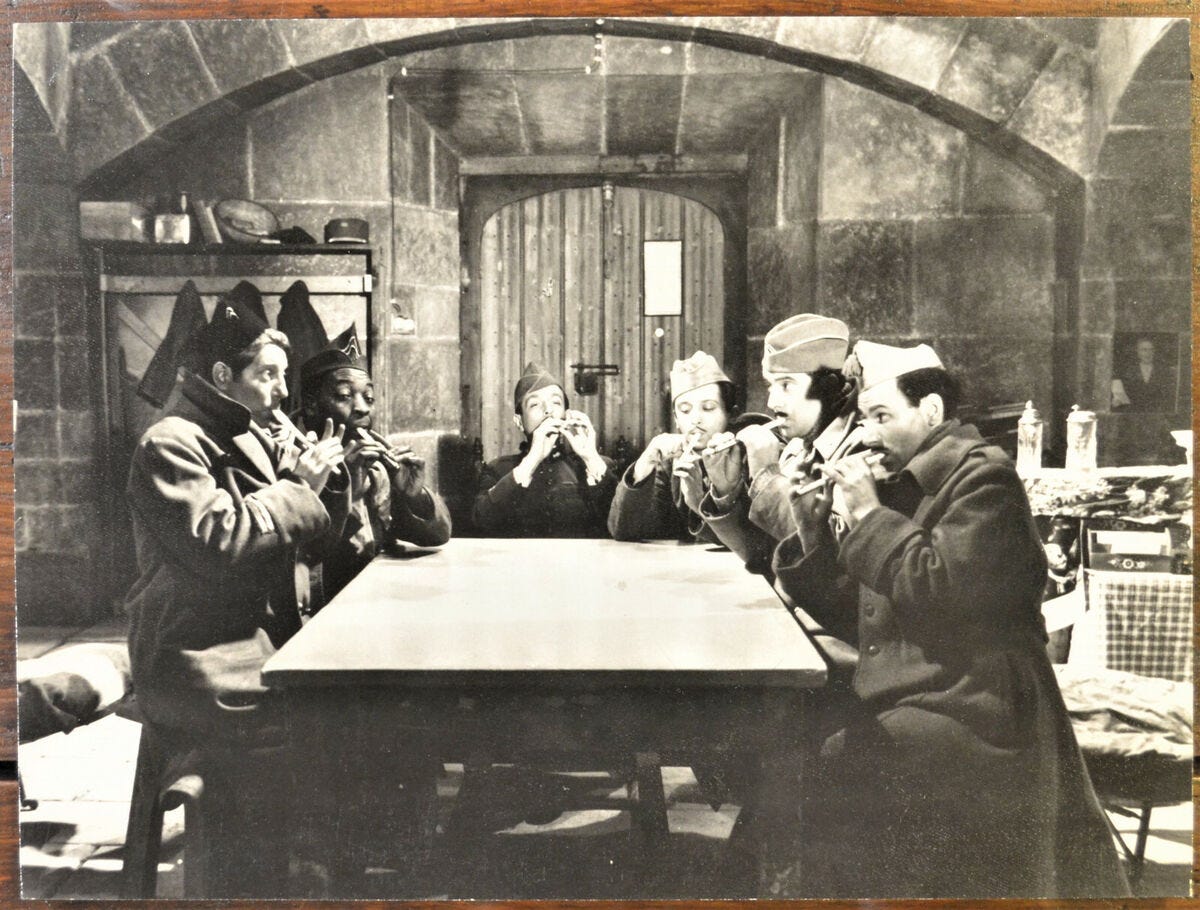
Rauffenstein stops the guards from firing at Boëldieu and pleads with his friend2 to give himself up. Boëldieu refuses, and Rauffenstein reluctantly shoots him with his pistol, aiming for his legs but misses and accidentally (and fatally) hits him in the stomach. Nursed in his final moments by a grieving Rauffenstein, Boëldieu laments that the whole purpose of the nobility and their usefulness to both French and German culture is being destroyed by the war. He expresses pity for von Rauffenstein, who will have to find a new purpose in the postwar world.
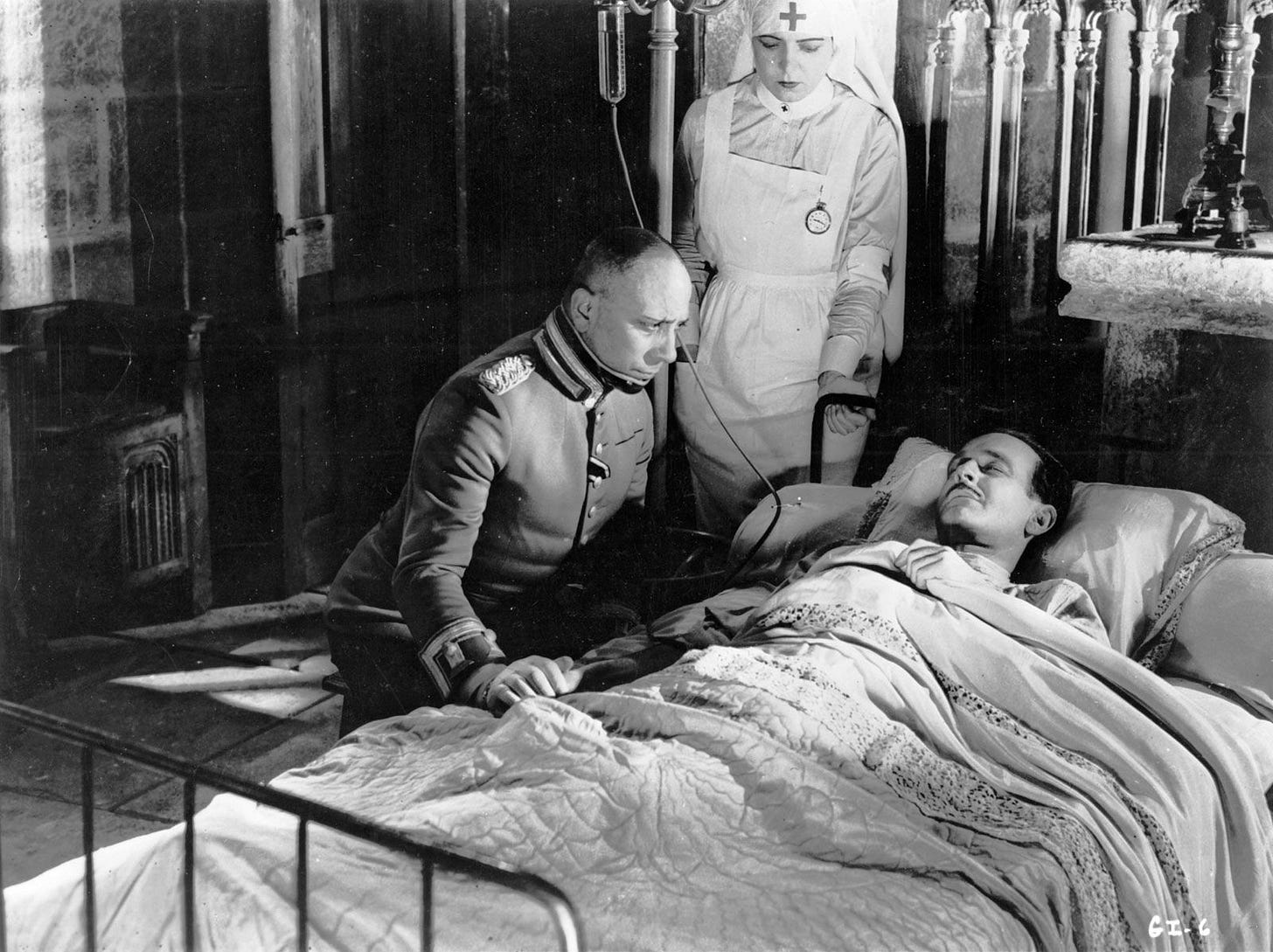
Maréchal and Rosenthal journey across the German countryside, trying to reach neutral Switzerland. Rosenthal injures his foot, slowing Maréchal down. They quarrel and part, but then Maréchal returns to help his comrade.
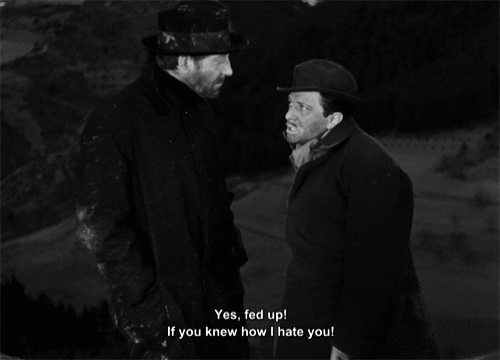
They take refuge in the modest farmhouse of a German woman, Elsa, who lost her husband at Verdun, along with three brothers, at battles which, with quiet irony, she describes as "our greatest victories". She takes them in and does not betray them to a passing army patrol. She and Maréchal fall in love, despite not speaking each other's language, but he and Rosenthal eventually leave from a sense of duty after Rosenthal recovers from his injury. Maréchal declares he will come back to Elsa and her young daughter, Lotte, if he survives the war.
Tyler: At one point, Elsa points to the kitchen table and says “The table’s grown too big,” which is an absolutely gutting way to say that people in your family have died.
Tyler: Anywho, this felt like yet another unexpected shift in plot: are they still trying to escape or are they enjoying integrating themselves into this domestic life a little too much? I understand wanting to take a break from war, not to mention hanging around with a cute German woman, but it felt even more abrupt than the camp transfer earlier in the movie.
Ellen: I will say though, this is a version of quickly falling in love that I can get behind. We don’t really know how long it is, but they show more realistic affection building than most movies of this time do, and the idea that the grief and trauma these people have undergone would contribute to just wanting to find something good makes sense to me.

A German patrol sights the two fugitives crossing a snow-covered valley. They fire a few rounds, but their commanding officer, hurrying to the scene, orders them to stop, saying the pair have crossed into Switzerland.
Ellen: At one point I could understand that in German they’re saying “12 kilometers,” but the subtitles say “about 8 miles.” I understand that it doesn’t really make sense for subtitles to be a direct translation a lot of the time, but I think we could have handled that one!
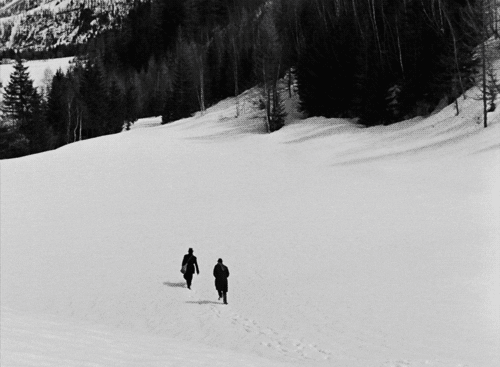
Intermission
Even though ILTBTA is free, please indulge us further and enjoy this quick “advertisement.”
This installment of ILTBTA is brought to you by … an International Deference to Rich Guys!
Are you a French aristocrat who’s just been shot down by the enemy? Are you a German flying ace just looking for somebody on your level to talk to? Do you want to be eating foie gras while your Russian counterparts are stuck with cabbage? All this and more can be solved with an International Deference to Rich Guys*!
*Side effects may include: alienation from your lower-class counterparts, a general distaste for anything that would sully a white glove, and an absolute gut-punch when your fellow Rich Guy is willing to die for two normies instead of hanging out with you in prison until the war is over and the two of you can go play squash or whatever.
Wiki-Wiki-Whaaat?
Love a good Wikipedia rabbit hole in search of some fun facts? Us too.
The Grand Illusion’s Wikipedia page has some interesting facts and anecdotes that we recommend you read through, but here are a few of our favorites:
The title of the movie comes from the influential 1909 pamphlet-turned-book The Great Illusion by British author Norman Angell. In the book, Angell argued that the economic cost of war in Europe was so great that war was unlikely to start (and if it did, it wouldn’t last long). Essentially, the theory was the economies of Europe were so interdependent and capitalist that war would be seen as simply too harmful. In sum, according to one academic: “The ‘Great Illusion’ was that nations gained by armed confrontation, militarism, war, or conquest.”
Angell lived an interesting life: after being schooled in England, France, and Switzerland, he emigrated at age 17 to the U.S., where he worked as a vine planter, an irrigation-ditch digger, a cowboy, a mail carrier, a prospector, and a newspaper reporter. After returning to Europe, he eventually became a member of Parliament, got knighted, and won the Nobel Peace Prize for his campaigning against the rising Nazi Germany. He later bought and lived on the only house on an island in Essex that was only attached to the mainland at low tide.
The Grand Illusion was directed by Jean Renoir, a French director whose work spanned from the silent era through the 1960s. Renoir’s two most well-received movies, The Grand Illusion and The Rules of the Game, are considered by film critics as some of the best French films of all time. He is considered one of the first filmmakers to be considered an auteur, which is essentially just an artist with a distinctive approach and style.
Certain elements of the plot were taken from Renoir’s own life. After being wounded in action as a reconnaissance pilot during WWI, Renoir was saved by a fellow French pilot, Armand Pinsard. Pinsard later claimed that he was shot down by German planes seven times and escaped from German POW camps after each time, serving as the model for Lt. Maréchal.
Ellen: It’s definitely much cooler to say that you escaped POW camps seven times than that your plane was shot down seven times.
Exterior shots of “Burg Wintersborn” were filmed at the real life Upper Koenigsbourg Castle in the Alsace region of France. For some reason, an exact copy of the castle was built in the hills outside Kuala Lumpur, Malaysia and is used as a hotel and spa.
In a classic example of “someone horrible hates this so it must be good,” Nazi Propaganda Minister Joseph Goebbels declared the film “Cinematic Public Enemy No. 1” after it won “Best Artistic Ensemble” at the Venice Film Festival. The Grand Illusion would also become the first foreign language film nominated for Best Picture at the Academy Awards.
Several renowned filmmakers (including Orson Welles, Martin Scorsese, and Billy Wilder) have lauded the film as one of the best ever. Famed film critic Roger Ebert wrote the following after the film’s 1999 re-release:
Apart from its other achievements, Jean Renoir's Grand Illusion influenced two famous later movie sequences. The digging of the escape tunnel in The Great Escape and the singing of the "Marseillaise" to enrage the Germans in Casablanca can first be observed in Renoir's 1937 masterpiece. Even the details of the tunnel dig are the same—the way the prisoners hide the excavated dirt in their pants and shake it out on the parade ground during exercise. But if Grand Illusion had been merely a source of later inspiration, it wouldn't be on so many lists of great films. It's not a movie about a prison escape, nor is it jingoistic in its politics; it's a meditation on the collapse of the old order of European civilization. Perhaps that was always a sentimental upper-class illusion, the notion that gentlemen on both sides of the lines subscribed to the same code of behaviour. Whatever it was, it died in the trenches of World War I.
Oscar NomNomNomz
Since we all know a movie is nothing without the food and drink it incorporates.
It’s now time to award the Oscar for Best Snacktor in a Supporting Role3. And the nomnomnominees are:
A celebratory shot for shooting down your second plane
A bar of chocolate from a prisoner's parcel
A tin of peas from a prisoner's parcel
Cold chicken, pate de foie, mackerel in wine, and a cup of cognac for your first meal at camp
Bread and a glass of milk from a kind German stranger
And the Oscar goes to … the tin of peas! Unfortunately, we ate the whole thing because we love peas, so our stomachs will accept this award on its behalf.
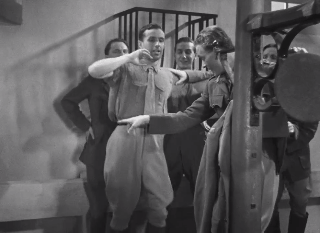
Fill In The Blank
How did we really feel about The Academy nominating this?
Ellen: I’d like to pull the Academy out of the secret tunnel they’re digging before they suffocate! As Tyler will say below, this is one that I thought about more than I expected to after finishing it. And perhaps I didn’t give it its best chance, watching on a laptop in the middle of the night in a subpar hotel room. I appreciate the angle that the conflict in the movie was much less about France vs. Germany, and much more about upper vs. lower class, or an old way of the world vs. the new. It adds a level of interpersonal interest between the Frenchmen, whereas otherwise a movie about French prisoners would have a pretty cut-and-dry us vs. them dynamic. And they even got to the horrors of war impacting real people with Elsa’s story, including an emphasis on common humanity, decency, and even love, without hitting us over the head with it. I think the themes it contains and the amount that I’ve thought about it show that a movie can be more than its viewing experience, and I’m glad to have seen this one.
Tyler: I’d like to send The Academy a prisoner parcel with some surprisingly good food in it. I have to admit, after watching this I thought it was good-not-great and perhaps a touch too ambitious4, but as time went on I found myself thinking about and appreciating it more and more. (As opposed to our previous ILTBTA movie, which I pretty much immediately forgot about. For a million dollars I couldn’t tell you the name of one character in that movie.) The plot swerves we mentioned were also pretty bold, and while I found the temporary domestication of our escapees a tad nonsensical, it at least served a greater purpose in what the film was trying to say. I think Roger Ebert hit the nail on the head in his analysis (the last bullet in Wiki-Wiki-Whaaat?), as The Grand Illusion has a lot to say about a lot and is so much more than a prison escape movie. Much like previous ILTBTA topics The Great Dictator and Foreign Correspondent, it also deserves praise for calling attention to (albeit more obliquely than those two) rising anti-Semitism and political extremism in Europe in the 1930s, a message that still resonates today (bangs head against wall). I’m sure this all “hit” even more at the time or with a little hindsight, but it still managed to maintain its watchability and message almost 90 years after its release.
Let The Credits Roll
Thanks for reading! Some quick housekeeping as you exit the theatre:
If you have plots and feelings of your own (on the movie or ILTBTA in general), feel free to comment on the post or simply reply to the email. If you liked reading this: tell your friends! If you hated reading this: tell your friends how much you hated it by forwarding it to them!
🚨NEWS🚨 We’ve made the decision to deactivate our Twitter/X account, AKA the beloved “ILT-Twitta.” While we enjoyed getting tens of impressions on our tweets and live-tweeting events like The Oscars and political debates (where we got hundreds of impressions), it ultimately was time to move on to less bot- and garbage-filled pastures. Perhaps we’ll pop up on Bluesky or Threads, perhaps we won’t. In the meantime, one place we’ll continue to be on is …
ILTBTA is on Letterboxd, the social networking/movie review site for movie fans! Follow us there to read our Spreadsheet comments of our ILTBTA movies, plus our ratings of other movies we watch.
If you’d like to start a wild Best Picture journey of your own, feel free to download a copy of The Spreadsheet. Bonus: checking off the boxes is oddly satisfying.
Post-Credits Scene
Get a sneak peek at the next ILTBTA installment.
To celebrate our second wedding anniversary (12/3, for those keeping track), our next post will be the 1949 romantic drama A Letter to Three Wives. While between the two of us we only have one wife, we’ll try to look past that as we watch three friends try to figure out which of their husbands is running off with another friend after they each receive the same mysterious letter.
A Letter to Three Wives is available to stream for three free on Youtube (here are three options: Option #1, Option #2, and Option #3) or, if you’d prefer to pay money for some reason, on the three major streaming rental services (Google Play, Apple TV, and Amazon Prime Video).
Until then, keep your enemies close and your illusions closer!
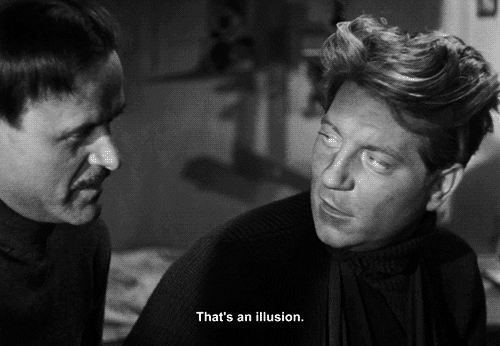
Sound like my ex-wife!
Ellen: Friend is Wikipedia’s word, and while I think that that’s how Rauffenstein feels about Boëldieu, I believe that the Frenchman might have something to say about the difference between being friendly and true friendship.
Results tabulated and certified by the accountants at Ernst & Yum™.
Note to past/present/future self: not all foreign movies with a message can be Parasite.
Ellen: But weirdly most of the foreign movies we’ve watched have a message about classism!





Who needs magic when you’ve got flutes, cold chicken, and the world's most dramatic escape rope? Classism never looked so... gourmet. Thanks for the peek inside this movie I haven't seen... and probably won't... a bit close to home for a big Robert Reich fan.
"Ellen: But weirdly most of the foreign movies we’ve watched have a message about classism!"
Not so strange perhaps. What do you think Marx and his predecessors and followers have been writing about for hundreds of years? Those ideas have been reflected in the popular culture of the time in multiple artistic endeavors, and particularly in Europe where class culture was the strongest. "Sorry" (using the Gilmore Girls pronunciation), didn't mean to get so pedantic, but your observation remains correct.